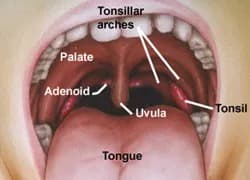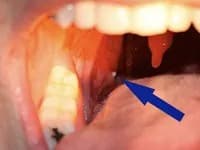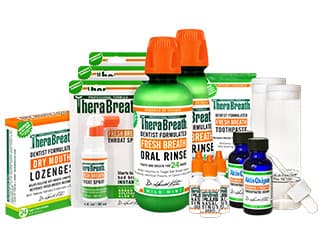What Are Tonsil Stones?
The Role of Tonsils
 Although the function of tonsils is not completely understood, most experts believe they play an important immune system role early in childhood. Tonsils are comprised of cells called lymphocytes. In children, these cells produce antibodies that help prevent respiratory illnesses. They gradually shrink by the time a person reaches puberty, although they never entirely disappear. The location of the tonsils enables them to trap incoming germs (viruses and bacteria). Although the immune function of tonsils may no longer ward off illness in adults, they can become inflamed due to the debris and bacteria they capture. When this occurs, tonsillitis may result. In severe and recurring cases, removal of the tonsils (tonsillectomy) may be necessary.
Although the function of tonsils is not completely understood, most experts believe they play an important immune system role early in childhood. Tonsils are comprised of cells called lymphocytes. In children, these cells produce antibodies that help prevent respiratory illnesses. They gradually shrink by the time a person reaches puberty, although they never entirely disappear. The location of the tonsils enables them to trap incoming germs (viruses and bacteria). Although the immune function of tonsils may no longer ward off illness in adults, they can become inflamed due to the debris and bacteria they capture. When this occurs, tonsillitis may result. In severe and recurring cases, removal of the tonsils (tonsillectomy) may be necessary.
How do Tonsil Stones Form?
 The formation of tonsil stones is caused by an accumulation of sulfur-producing bacteria and debris that become lodged in the tonsils. The debris may include food particles and mucus from postnasal drip. This matter decays in the back of the throat and collects in the small crevices (crypts) on the surface of the tonsils. The affected area attracts additional debris and after enough accumulates, it begins to calcify, resulting in hard white or yellow formations. In some cases, a single large stone will form on a tonsil, while in other cases, multiple small stones will appear. The debris that comprises a tonsil stone comes from many sources, but does not require the presence of a tonsil infection to form. While tonsil stones may be or may not result from tonsil inflammation, there is evidence they occur more frequently in people who have repeated bouts of tonsillitis.
The formation of tonsil stones is caused by an accumulation of sulfur-producing bacteria and debris that become lodged in the tonsils. The debris may include food particles and mucus from postnasal drip. This matter decays in the back of the throat and collects in the small crevices (crypts) on the surface of the tonsils. The affected area attracts additional debris and after enough accumulates, it begins to calcify, resulting in hard white or yellow formations. In some cases, a single large stone will form on a tonsil, while in other cases, multiple small stones will appear. The debris that comprises a tonsil stone comes from many sources, but does not require the presence of a tonsil infection to form. While tonsil stones may be or may not result from tonsil inflammation, there is evidence they occur more frequently in people who have repeated bouts of tonsillitis.
Facts and Stats
- The National Center for Biotechnology Information found that 75% of patients with high amounts of sulfur in their mouth (a leading cause of bad breath) had tonsil stones.
- A Japanese study published in 2014 uncovered a higher incidence of tonsil stones than prior studies. Of 482 individuals, 222 (46.1%) had tonsil stones based on CT scans while only 37 (7.7%) had tonsil stones based solely on panoramic radiographs.
- Tonsil stones typically occur in adults between the ages of 20 and 40 and affect an estimated 6 to 10% of people in the U.S. annually.
- Doctors have removed tonsil stones ranging from .10 ounce to as large as 1.5 ounces.
Risk Factors
Studies have shown that the following factors increase the risk of tonsil stones:
- Postnasal drip
- Medication-related dry mouth
- Chronic or recurrent purulent tonsillitis
- Overactive salivary glands
- Sinus and bacterial infections
- Excessive accumulation of dead leukocytes (white blood cells)
- The action of enzymes on food that is trapped in the mouth
- Certain dietary and lifestyle factors (e.g. alcohol use, too much refined food, stress)
- Genetic factors such as the size, shape, and depth of the tonsil pockets/crevices
Tonsil Stone Diagnosis
Tonsil stones are often not visible to the naked eye because tonsils have twists and folds that provide a hiding place for stones to form. The organic nature of the stones also makes them difficult to detect. Due to their small size and the structure of the tonsils, they may not be visible, even when the mouth is wide open. Tonsil stones are often diagnosed coincidentally during dental x-rays or CT scans.
Tonsil Stone Symptoms
After a period of time, it is not uncommon to cough up small, hard whitish spheres, which are stones that have dislodged from your tonsils. Tonsil stones are not as hard as organic stones and will not cause damage if swallowed accidentally.
When tonsil stones combine with the volatile sulfur compounds produced by bacteria beneath the surface of the tongue, they can cause chronic and severe bad breath (halitosis). If you have bad breath that does not improve with the use of regular toothpastes, mouthwashes and other products, you may have tonsil stones. The stones may cause difficulty swallowing, especially when they are large or the tonsils are inflamed.
Some patients don't notice the formation of stones in their mouths, and the stones may remain asymptomatic, even as they harden. The size and placement of the tonsil stones dictate the symptoms to a large degree. In many patients, there are a number of cardinal symptoms that can indicate tonsil stones, including:
- A sore throat or feeling that the throat is restricted
- Difficulty swallowing (dysphagia)
- Coughing or choking
- Persistent ear pain due to shared nerve pathways
- Foul and long-lasting bad breath that is not related to food or morning breath
- Metallic taste in the mouth
- Visible white spots when large stones emerge from the tonsil crevices
- Tonsil inflammation and swelling
- Dizziness (rare)
Tonsil Stone Prevention
Most people whose tonsils have been removed will not develop tonsil stones. However, having tonsils removed is not a practical or optimal solution in most cases. Tonsil removal in children is relatively risk-free. However, adults who undergo tonsillectomies often experience longer recuperation times, greater pain, and occasional problems resulting from adverse anesthesia reactions.
Unless tonsil stones are manually removed or prevented, bad breath will persist. This problem may become so severe that a person is too ashamed to interact with friends or family. Fortunately, there are several things you can do to help prevent tonsil stones from forming without having your tonsils removed.
Tips for Reducing the Formation of Tonsil Stones
- Brush your teeth and tongue twice a day
- Rinse your mouth with an oxygenating mouthwash
- Drink water after a meal to wash down food particles that may remain in the throat
- Irrigate the tonsils weekly with an oral irrigator to prevent debris and bacteria from accumulating in tonsil crevices
- Clean nasal passages to decrease postnasal drip, an underlying cause of tonsil stones
- Limit dairy products in your diet because these foods are rich in the protein anaerobic bacteria thrive on
- Avoid excessive alcohol consumption because alcohol is a diuretic and causes dry mouth
Watch Dr. Katz Discuss Tonsil Stones and Their Treatment
TheraBreath products contain natural and oxygenating ingredients that help prevent tonsil stones and bad breath. TheraBreath's Tonsil Stones Deluxe Kit contains everything you need to attack sulfur-producing bacteria while helping to improve overall oral health. The combination of these products will result in a clean, oxygen-rich, pleasant-smelling environment.

TheraBreath Plus Nasal-Sinus Drops help prevent tonsil stones by oxygenating the sinuses and back of the throat with the power of OXYD-8. They are also a great choice for people who suffer from bad breath due to allergies, postnasal drip, and chronic dry mouth.
If you want to prevent bad breath and tonsil stones on a long-term basis, you must use oxygenating toothpaste, mouthwash, and a tongue cleaner to effectively neutralize the anaerobic bacteria from the back of the tongue. This twice-daily regimen will help prevent tonsil stones from recurring.
Many patients who have followed the recommended regimen using TheraBreath oxygenating products have reported great success combatting tonsil stones and preventing their recurrence. In fact, some patients have reported results in as little as one day after starting treatment.
Click here to download our handy Tonsil Stones booklet.
* Statements on this page have not been evaluated by the Food and Drug Administration. These products are not intended to diagnose, treat, cure, or prevent any disease. The material on this site is provided for informational purposes only. Always consult your healthcare professional before beginning any new therapy.
